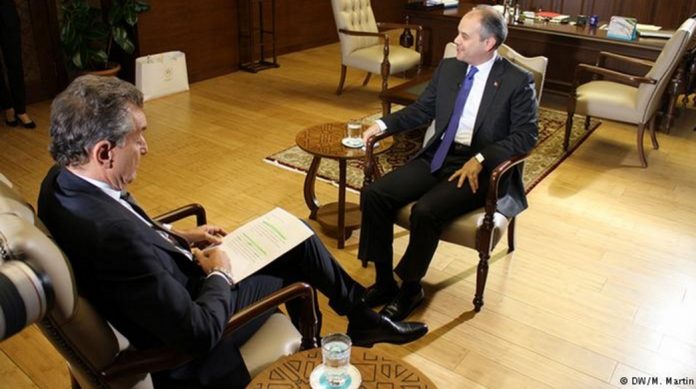
LONDON – German state-funded broadcaster Deutsche Welle has filed a lawsuit against the Turkish Ministry of Youth and Sports in a development that could have wider implications for relations between the two countries.
DW announced Monday that it had taken the decision after a videotaped interview it conducted with Turkish Sports Minister Akif Cagatay Kilic on Sept. 5 was allegedly confiscated by Turkish authorities the same day. Turkey first denied those allegations. But DW stuck to its claims and gave the ministry repeated deadlines to hand over the material before it took legal steps Monday.
According to DW, its host discussed issues, such as the recent coup attempt, “press freedom and the status of women.” Turkish officials insisted that the footage should not be aired, before confiscating the tapes, the German channel said. Although it is funded by the German government, the channel perceives itself as being focused on fostering press freedom and mainly operates abroad.
“We advocate unrestricted press freedom. Turkey is closely connected to Europe. Along with that comes respect for democratic fundamental principles,” the DW board’s chairman, Karl Jüsten, was quoted as saying Monday. “It is deeply troubling that Deutsche Welle has been forced to file suit in court for the return of the video interview with the Turkish minister.”
DW host Michel Friedman who conducted the interview is known in Germany as a provocative on-air journalist, but the channel says it had discussed the topics of the interview with the ministry in advance.
The German government has backed the efforts undertaken by its international broadcaster to get back its footage. “Press freedom is a great and nonnegotiable value for us,” said government spokesman Steffen Seibert.
Relations among Turkey and European countries, including Germany, are increasingly strained. Turkey complains that Europe has not made a significant effort to condemn the July coup attempt, and has protested being tasked with absorbing Syrian refugees without being granted the concessions it had hoped for from the European Union. A deal struck earlier this year required Turkey to take back refugees who had risked the journey to Europe and fled through Turkey to countries, such as Greece. In return, the European Union originally agreed to Turkey’s demand to grant its citizens visa-free travel in Europe. That promise is yet to be fulfilled.
Germany is a particular case, nonetheless: About 3 million Turkish immigrants live in the country. Half hold Turkish citizenship and are allowed to vote in Turkish elections. Turkish citizens living in Germany voted overwhelmingly for President Recep Tayyip Erdogan’s Justice and Development (AKP) party in elections last year.
The importance of Erdogan’s AKP to Turkish immigrants living in Germany has worried politicians in Europe’s economic powerhouse. German authorities have noticed a rise in violent clashes between Turkish AKP supporters living in Germany and Kurdish immigrants or members of the Gulen movement – tensions that have mainly spilled over from Turkey, officials said. Erdogan has publicly accused the Gulen movement (named after self-exiled, U.S.-based cleric Fethullah Gulen) of organizing the July coup attempt and has arrested thousands of its alleged members in Turkey.
Turkish citizens started arriving in Germany as “guest workers” at the beginning of the 1960s. Originally invited with the goal of filling job vacancies, many of them never returned to their country of origin.
Tensions became particularly apparent in June, when the German Parliament recognized the Armenian “genocide” – a decision that resulted in Turkey’s withdrawing its ambassador to Germany. Other nations have also described the massacre of 1 million to 1.5 million Armenians living in the Ottoman Empire in 1915 as a genocide, but none of them are home to such a significant Turkish minority as Germany.
Back then, the resolution was seen as a threat to the refugee deal the European Union had struck with Turkey earlier this year.
The escalating dispute about DW’s interview could add more difficulties to ongoing negotiations between Turkey and Europe, the channel suggested on its website Monday.
Featured Image: Deutsche Welle
(c) 2016, The Washington Post · Rick Noack

